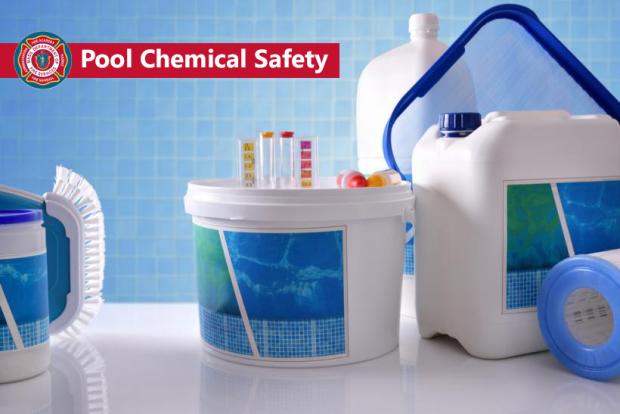Storage
- Carefully follow the manufacturer’s instructions.
- Store chemicals in a dry, secure area outside the home or attached garage. A locked, stand-alone shed is best. Lock your storage area to keep children, pets, and unauthorized users out.
- Keep your storage area free of rags, trash, debris, or other materials that could clutter the area. Keep combustible and flammable substances away from the area.
- Separate incompatible substances. The most common pool chemicals are inherently incompatible with each other, so be sure to keep them apart.
- Avoid storing containers of liquids above containers of powders or other incompatible substances to prevent accidental mixing caused by leaking containers.
- Do not mix old chemicals with fresh chemicals, even if they are the same type.
- Use separate, designated scoops for each chemical. Handle only one chemical at a time and make sure that tools used with one substance are not used with another unless all residues are removed.
- Use separate, designated containers for cleanup of spilled materials to avoid inadvertent mixing of spilled substances. Consult your local hazardous waste disposal facility for more detailed information on proper waste disposal.
Use
- Carefully follow the manufacturer’s instructions.
- Handle pool chemicals outdoors in a well-ventilated area.
- Use gloves, eye protection, and masks as indicated on the packaging.
- Children should never handle pool chemicals. Even teenagers should not do so without constant adult supervision.
- Remember: powder in the water, never water in the powder.
- Replace the lid on chemical containers every time when you are done with them. When containers are left open, water can get in and react with the chemicals.
- Thoroughly clean tools and equipment that were used to handle one chemical before using them with a different chemical.
- Spilled substances (from damaged containers or accidents) must be cleaned up and disposed of properly to avoid creating an inadvertent chemical reaction.
- Mixing chemicals can lead to a chemical reaction that generates temperatures high enough to ignite nearby combustible materials. Mixing can also lead to the release of highly toxic and dangerous chlorine gas.
Disposal
Do not dispose of old pool chemicals in the trash or down the drain. Take old chemicals to a household hazardous waste collection day in your community or to a commercial hazardous waste facility. Since sodium hypochlorite (bleach) is the same chemical used in most water treatment facilities, check to see if your local plant will accept the chemical.
